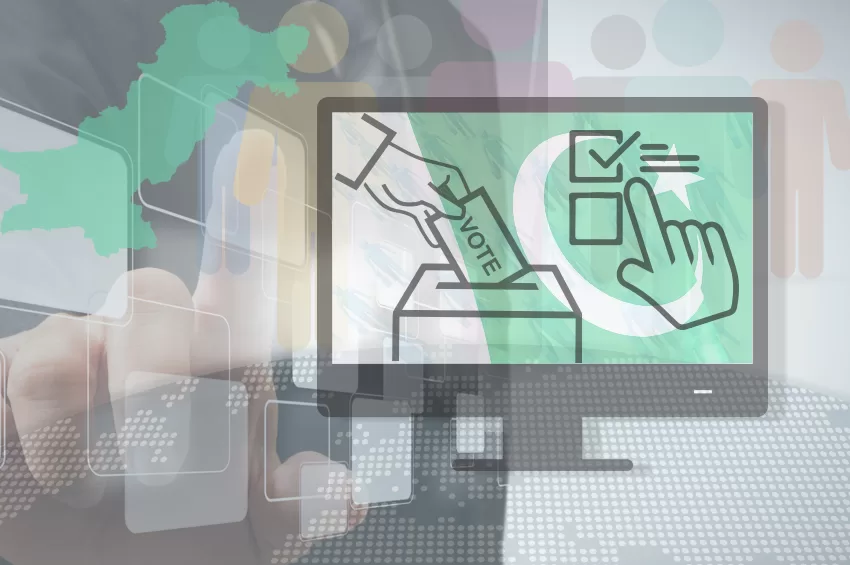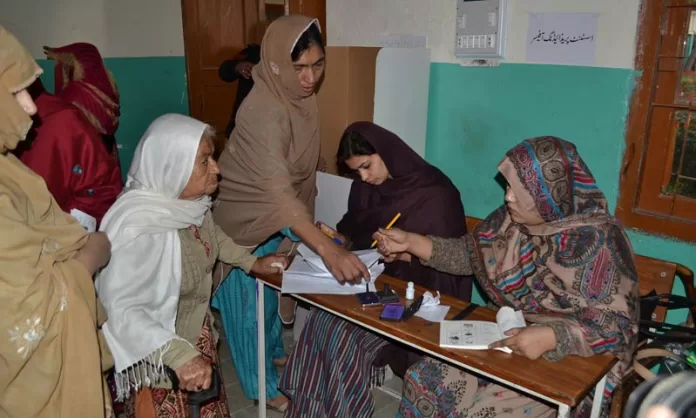May 11, 2013 marks my maiden successful attempt at exercising my adult franchise voting rights. My earlier two efforts in 2002 and 2007 were in vain as despite having registered in a particular polling station, I was informed on my arrival that my name was mysteriously missing from the list.
Violence, threats and voter intimidations by TTP had already marred the 2013 electioneering campaigns and pundits predicted disruption and mayhem during the balloting process on the day of the election. The danger to life and limb of the voters brave enough to ignore the threat of the militants notwithstanding, my family decided to cast our votes and not succumb to the terror groups’ blackmail. A few minutes past eight AM the scheduled opening hours for the start of the balloting we were at our designated polling station where already over a hundred had queued up for the purpose. A solitary policeman was noticed at the entrance and one tent was pitched close by manned by a religious party where their volunteers were providing necessary useful information to those who wanted to confirm if their names had been registered in that particular polling station – there was no canvassing or harassment.
Inside the polling station there were four booths in operations, two for men and two for the ladies. The progress was slow but steady and within half an hour of our arrival on the scene we were inside the polling booths. The overall ambiance was calm and gave the impression of a festive occasion. The confirmation of our identities and issuance of ballot papers duly authenticated was conducted in an orderly manner and each one of us there was able to stamp the ballot papers in complete privacy and drop them in the respective ballot boxes. In about an hour we had discharged our voting duties successfully and had returned to the safety of our home. The entire process was a very pleasant surprise.
After the end of the scheduled polling time we were glued to the TV set monitoring the unofficial results that were unfolding thick and fast. By midnight we learned that the candidate we had voted for had lost; we were sad but not disheartened as we had fulfilled our constitutional duty by exercising our right of voting.
Most of the election results had been announced by the next day and it appeared that the entire process had been fairly free and fair although sporadic incidences of violence and ballot tampering were circulating. Unfortunately as the days progressed, reports of ballot stuffing with bogus votes and numerous incidences of theft of ballot boxes started to surface. Many of these were captured on cell phone videos that appeared in the social media. To the general public it became evident that the much hyped Election 2013 was neither free nor fair, regardless of the self congratulatory pronouncement of the Election Commission and the clean chits issued by the foreign observers and foreign media houses.
Our respected members of the judiciary had been given the complete responsibility of organizing and conducting the elections. The scrutiny of the candidates was conducted by serving judges and magistrates of the lower courts and the entire panel of the ECP comprised retired judges of the Supreme Court. While it will be unjust to question their integrity, the unfair and almost unbecoming manner in which a number of the presiding officers conducted the scrutiny of the candidates cast long shadows over their competency and bias. ECP’s utter lack of administrative competence was thoroughly exposed in the revelation of massive irregularities in a number of polling stations that have surfaced since then.
The country’s first ‘free and fair elections’ in 1970 eventually led to its dismemberment and many have voiced their fears that the second one may lead to another disaster of a similar magnitude. We hope not and I sincerely believe, not based on sentiments and optimism alone, but on my brief study of our history, we will come out of this crisis relatively unscathed. However, we definitely need to revisit our electioneering methodology to obviate the repeat performance of the malpractices that were rampant in 2013. Here are some suggestions that deserve a serious study.
Stamping of ballot papers, dropping them in the ballot boxes and then physically counting them is the current electioneering mode in Pakistan – it is also laborious, susceptible to malpractices and outdated. In a society where respect for law and order is an exception rather than the rule and where justice is compromised by use of sheer brute strength, complaints of ballot fraud will continue until the very fabric of the society improves by a factor of two or more. Until that happens, therefore, there is a dire need to get rid of the paper balloting and switch to electronic voting system where human errors and physical tampering of votes can be reduced to the bare minimum. This system is in vogue in most developed nations and in India where it has been implemented very successfully.
A decade ago electronic voting in Pakistan might have been beyond its technical and financial means because both software and hardware required for such a venture were expensive. Today this is no more valid because Pakistan has acquired a crop of world class software programmers and the cost of hardware has also come down substantially. Both financially and technically developing and deploying a computer-based electronic voting system is well within our reach.

Software development and equipping all polling booths with electronic voting system will entail additional expenses but this will be balanced by the savings that would occur by the elimination of ballot paper printing and delivery, purchase and security of ballot boxes and the onerous physical labour that have to be employed in manual vote counting. With the cost of computerized system coming down while the cost of manual labour rising, the financial mathematics very likely will be in favour of computer balloting. Even if for the sake of argument higher cost is incurred in introduction of the modern computer based electronic voting system, the relatively much greater level of vote security and near elimination of ballot tampering would make it an outright winner.
Critics of electronic voting will point out that a large number of our rural voters may be disenfranchised because of their inability to grasp the complexities of electronic voting. This objection might have been valid a decade ago but with the proliferation of cell phones which have become virtual household items in rural/urban and rich/poor circles, using the electronic keyboard for voting has become a relatively simple matter and is no more a hurdle. Pakistan, India and Bangladesh are among nations with the lowest cell phone call rates and a vast majority of its population, even the illiterate ones possess and operate cell phones and are familiar with the art and intricacies of keyboard operations that would be used in electronic voting.
‘Software programs can be hacked thus making electronic voting susceptible to electioneering fraud,’ is another valid observations critics of electronic voters can come up with. True, to some extent electronic hacking where the complete site is destroyed or made unusable is possible but modern technology can make such attempts very difficult and enough remedial measures can be incorporated in the system to identify and correct any wrongdoings. While electronic voting might not ensure a hundred percent security, compared to paper balloting it is far safer.
The introduction of fingerprint identification of voters will help eliminate much of the foul play currently associated with ballot manipulation. At present voter listing is conducted with the help of National Identity Card where the individual’s fingerprint is recorded and these could be made the passwords by which a voter is able to access the election symbols and cast his vote by pressing a button rather than stamping a paper. In this manner bogus voting will be practically eliminated as duplication of fingerprint by another person is practically impossible while errors by design or default in vote counting and consolidation will also become a thing of the past.
Despite flaws that have surfaced in the General Elections 2013, the overall results should be accepted and we need to move forward. However, where authentic proofs of irregularities have been presented to the ECP, re-polling in those seats should be held. If re-polling is considered necessary in any constituency it should not be held on selected stations only. The decision to do so in NA 250 created more controversies than it resolved.
From the figures of disputed seats that have been made public, a re-polling in those constituencies will not alter the overall result substantially; PML (N) will still remain the largest party in the centre and Punjab by a wide margin while PPP and PTI will continue to head Sindh and Khyber Pakhtunkhwa provinces respectively. Re-polling in disputed constituencies will help restore public confidence in the sanctity of their votes.
It is time we as a nation should move forward, look ahead and introduce changes in the manner future elections are conducted to avoid dodging a bullet that we had to confront in General Elections 2013.




